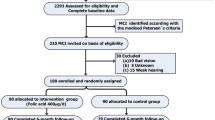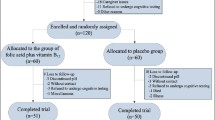Abstract
Purpose
Observational studies have frequently reported that low blood folate concentrations are associated with poor cognitive performance. Our previous studies have shown the potential beneficial effect on the metabolite levels of methionine cycle and peripheral blood inflammatory cytokines from 6- and 12-month folic acid supplementation on cognitive function in mild cognitive impairment (MCI). This study aims to continue exploring the effect of 24-month folic acid supplementation on cognitive function and pathological mechanism in MCI.
Methods
180 individuals with MCI were identified and randomly divided into intervention (folic acid 400 µg/day, n = 90) and convention (n = 90) groups. Cognitive function (WAIS-RC) and blood Aβ-related biomarkers were measured at baseline and at 6, 12, 18, and 24 months. Data were analyzed using generalized estimating equation. This trial has been registered with Trial Number: ChiCTR-TRC-13003227.
Results
During the follow-up, scores of full scale IQ, verbal IQ, and subdomains of Information and Digit Span were significantly higher in the intervention group than those in the convention group (P < 0.05). In the intervention group, blood homocysteine, S-adenosylhomocysteine (SAH), Aβ-42, and the expression of APP-mRNA were decreased (P < 0.05), while S-adenosylmethionine (SAM), SAM/SAH ratio, and the expression of DNA methyltransferase mRNA were increased (P < 0.05).
Conclusion
Folic acid supplementation appears to improve cognitive function and reduce blood levels of Aβ-related biomarkers in MCI. Larger-scale double-blind placebo-controlled randomized trials of longer duration are needed.


Similar content being viewed by others
Abbreviations
- Aβ:
-
β-Amyloid
- AD:
-
Alzheimer’s disease
- APP:
-
Amyloid precursor protein
- CNS:
-
Central nervous system
- CI:
-
Confidence intervals
- GEE:
-
Generalized estimating equation
- Hcy:
-
Homocysteine
- ITT:
-
Intention-to-treat
- MCI:
-
Mild cognitive impairment
- PIQ:
-
Performance IQ
- PS1:
-
Presenilin-1
- SAH:
-
S-Adenosylhomocysteine
- SAM:
-
S-Adenosylmethionine
- VIQ:
-
Verbal IQ
References
Petersen RC, Doody R, Kurz A, Mohs RC, Morris JC, Rabins PV, Ritchie K, Rossor M, Thal L, Winblad B (2001) Current concepts in mild cognitive impairment. Arch Neurol 58:1985–1992
Petersen RC, Stevens JC, Ganguli M, Tangalos EG, Cummings JL, DeKosky ST (2001) Practice parameter: early detection of dementia: mild cognitive impairment (an evidence-based review). Report of the Quality Standards Subcommittee of the American Academy of Neurology. Neurology 56:1133–1142
Korczyn AD (2016) Parkinson’s and Alzheimer’s diseases: focus on mild cognitive impairment. Parkinsonism Relat Disord 22:S159–S161
Gillette-Guyonnet S, Secher M, Vellas B (2013) Nutrition and neurodegeneration: epidemiological evidence and challenges for future research. Br J Clin Pharmacol 75:738–755
Smith AD, Refsum H (2016) Homocysteine, B vitamins, and cognitive impairment. Annu Rev Nutr 36:211–239
Michelakos T, Kousoulis AA, Katsiardanis K, Dessypris N, Anastasiou A, Katsiardani KP, Petridou ET (2013) Serum folate and B12 levels in association with cognitive impairment among seniors: results from the VELESTINO study in Greece and meta-analysis. J Aging Health 25:589–616
Clarke R, Bennett D, Parish S, Lewington S, Skeaff M, Eussen SJ, Lonn E (2014) Effects of homocysteine lowering with B vitamins on cognitive aging: meta-analysis of 11 trials with cognitive data on 22,000 individuals. Am J Clin Nutr 100:657–666
Li MM, Yu JT, Wang HF, Jiang T, Wang J, Meng XF, Tan L (2014) Efficacy of vitamins B supplementation on mild cognitive impairment and Alzheimer’s disease: a systematic review and meta-analysis. Curr Alzheimer Res 11:844–852
Fuso A, Seminara L, Cavallaro RA, D’Anselmi F, Scarpa S (2005) S-adenosylmethionine/homocysteine cycle alterations modify DNA methylation status with consequent deregulation of PS1 and BACE and beta-amyloid production. Mol Cell Neurosci 28:195–204
Gonda TA, Kim YI, Salas MC, Gamble MV, Shibata W, Muthupalani S, Sohn KJ, Abrams JA, Fox JG, Wang TC, Tycko B (2012) Folic acid increases global DNA methylation and reduces inflammation to prevent Helicobacter-associated gastric cancer in mice. Gastroenterology 142:824–833
Sinclair KD, Allegrucci C, Singh R, Gardner DS, Sebastian S, Bispham J, Thurston A, Huntley JF, Rees WD, Maloney CA, Lea RG, Craigon J, McEvoy TG, Young LE (2007) DNA methylation, insulin resistance, and blood pressure in offspring determined by maternal periconceptional B vitamin and methionine status. Proc Natl Acad Sci 104:19351–19356
Ma F, Wu T, Zhao J, Han F, Marseglia A, Liu H, Huang G (2016) Effects of 6-month folic acid supplementation on cognitive function and blood biomarkers in mild cognitive impairment: a randomized controlled trial in China. J Gerontol Ser A Biol Sci Med Sci 71:1376–1383
Ma F, Wu T, Zhao J, Song A, Liu H, Xu W, Huang G (2016) Folic acid supplementation improves cognitive function by reducing the levels of peripheral inflammatory cytokines in elderly Chinese subjects with MCI. Sci Rep 6:37486
Salminena A, Haapasalo A, Kauppinen A, Kaarniranta K, Soininen H, Hiltunen M (2015) Impaired mitochondrial energy metabolism in Alzheimer’s disease: impact on pathogenesis via disturbed epigenetic regulation of chromatin landscape. Prog Neurobiol 131: 1–20
Leszek J, Sochocka M, Gąsiorowski K (2012) Vascular factors and epigenetic modifications in the pathogenesis of Alzheimer’s disease. J Neurol Sci 323:25–32
Berry RJ, Li Z, Erickson JD, Li S, Moore CA, Wang h, Mulinare J, Zhao P, Wong LY, Gindler J, Hong SX, Hao L, Gunter E, Correa A (1999) Prevention of neural-tube defects with folic acid in China. N Engl J Med 341:1485–1490
David SW, Anuradhani K, Mark S (2010) Effect of folic acid, with or without other B vitamins, on cognitive decline: meta-analysis of randomized trials. Am J Med 123:522–527
Maike W, Mirja H, Anke F, Uwe T, Andreas H (2005) Cognitive performance in relation to vitamin status in healthy elderly German women—the effect of 6-month multivitamin supplementation. Prev Med 41:253–259
Kohout FJ, Berkman LF, Evans DA, Cornoni-Huntley J (1993) Two shorter forms of the CES-D depression symptoms index. J Aging Health 52:179–193
Rose GA, Blackburn H, Gillum RF, Prineas RJ (1982) Cardiovascular survey methods, vol 58. World Health Organization, Geneva, pp 162–165
Gu D, Reynolds K, Wu X, Chen J, Duan X, Muntner P, Huang G, Reynolds RF, Su S, Whelton PK, He J, InterASIA Collaborative Group (2014) The International Collaborative Study of Cardiovascular Disease in ASIA. Prevalence, awareness, treatment, and control of hypertension in China. Hypertension 40:920–927
Gong Y (1983) Revision of Wechsler’s adult intelligence scale in China. Acta Psychol Sin 15(3):121–129
Kado DM, Karlamangla AS, Huang MH, Troen A, Rowe JW, Selhub J, Seeman TE (2005) Homocysteine versus the vitamins folate, B6, and B12 as predictors of cognitive function and decline in older high-functioning adults: MacArthur Studies of Successful Aging. Am J Med 118:161–167
Nurk E, Refsum H, Tell GS, Engedal K, Vollset SE, Ueland PM, Nygaard HA, Smith AD (2005) Plasm total homocysteine and memory in the elderly: the Hordaland Homocysteine Study. Ann Neurol 58:847–857
Tucker KL, Qiao N, Scott T, Rosenberg I, Spiro A III (2005) High homocysteine and low B vitamins predict cognitive decline in aging men: the Veterans Affairs Normative Aging Study. Am J Clin Nutr 82:627–635
Smith AD (2008) The worldwide challenge of the dementias: a role for B vitamins and homocysteine? Food Nutr Bull 29:S143–S172
Bryan J, Calvaresi E, Hughes D (2002) Short-term folate, vitamin B-12 or vitamin B-6 supplementation slightly affects memory performance but not mood in women of various ages. J Nutr 132:1345–1356
Durga J, van Boxtel MP, Schouten EG, Kok FJ, Jolles J, Katan MB, Verhoef P (2007) Effect of 3-year folic acid supplementation on cognitive function in older adults in the FACIT trial: a randomised, double blind, controlled trial. Lancet 369:208–216
Jager CA, Oulhaj A, Jacoby R, Refsum H, Smith AD (2012) Cognitive and clinical outcomes of homocysteine-lowering B-vitamin treatment in mild cognitive impairment: a randomized controlled trial. Int J Geriatr Psychiatry 27:592–600
Fioravanti M, Ferrario E, Massaia M, Cappa G, Rivolta G, Grossi E, Buckley AE (1998) Low folate levels in the cognitive decline of elderly patients and the efficacy of folate as a treatment for improving memory deficits. Arch Gerontol Geriatr 26:1–13
den Heijer T, Vermeer SE, Clarke R, Oudkerk M, Koudstaal PJ, Hofman A, Breteler MM (2003) Homocysteine and brain atrophy on MRI of non-demented elderly. Brain 126:170–175
Selkoe DJ (1999) Translating cell biology into therapeutic advances in Alzheimer’s disease. Nature 399:A23–A31
Li W, Liu H, Yu M, Zhang X, Zhang M, Wilson JX, Huang G (2015) Folic acid administration inhibits amyloid β-peptide accumulation in APP/PS1 transgenic mice. J Nutr Biochem 26:883–891
Dronse J, Fliessbach K, Bischof GN, von Reutern B, Faber J, Hammes J (2017) In vivo patterns of tau pathology, amyloid-β burden, and neuronal dysfunction in clinical variants of Alzheimer’s disease. J Alzheimers Dis 55:465–471
DeMattos RB, Bales KR, Cummins DJ, Paul SM, Holtzman DM (2002) Brain to plasm amyloid-β efflux: a measure of brain amyloid burden in a mouse model of Alzheimer’s disease. Science 295:2264–2267
Mehta PD, Pirtilla T, Mehta SP, Sersen EA, Aisen PS, Wisniewski HM (2000) Plasm and cerebrospinal fluid levels of amyloid beta proteins 1–40 and 1–42 in Alzheimer disease. Arch Neurol 57: 100–105
Teunissen CE, de Vente J, Steinbusch HWM, De Bruijn C (2002) Biochemical markers related to Alzheimer’s dementia in serum and cerebrospinal fluid. Neurobiol Aging 23:485–508
Bush AI, Whyte S, Thomas LD, Williamson TG, Van Tiggelen CJ, Currie J, Small DH, Moir RD, Li QX, Rumble B (1992) An abnormality of plasm amyloid protein precursor in Alzheimer’s disease. Ann Neurol 32:57–65
Martins RN, Muir J, Brooks WS, Creasey H, Montgomery P, Sellers P, Broe GA (1993) Plasm amyloid precursor is decreased in Alzheimer’s disease. Neuroreport 4:757–759
Mayeux R, Honig LS, Tang MX, Manly J, Stern Y, Schupf N, Mehta PD (2003) Plasm Aβ40 and Aβ42 and Alzheimer’s disease: relation to age, mortality, and risk. Neurology 61:1185–1190
Seppälä TT, Herukka S-K, Hänninen T, Tervo S, Hallikainen M, Soininen H, Pirttilä T (2010) Plasm Aβ42 and Aβ40 as markers of cognitive change in follow-up: a prospective, longitudinal, population-based cohort study. J Neurol Neurosurg Psychiatry 81:1123–1127
Reynolds EH (2002) Folic acid, ageing, depression, and dementia. Br Med J 324:1512
Duncan TM, Reed MC, Nijhout HF (2013) A population model of folate-mediated one-carbon metabolism. Nutrients 5:2457–2474
Smith DEC, Smulders YM, Blom HJ, Popp J, Jessen F, Semmler A, Farkas M, Linnebank M (2012) Determinants of the essential one-carbon metabolism metabolites, homocysteine, S-adenosylmethionine, S-adenosylhomocysteine and folate, in cerebrospinal fluid. Clin Chem Lab Med 50:1641–1647
Jones PA, Takai D (2001) The role of DNA methylation in mammalian epigenetics. Science (Washington DC) 293:1068–1070
Greger V, Passarge E, Hopping W, Messmer E, Horsthemke B (1989) Epigenetic changes may contribute to the formation and spontaneous regression of retinoblastoma. Hum Genet 83:155–158
Acknowledgements
The authors thank all of the subjects for their participation. This study was also supported by grants from Tianjin Science and Technology Support Program (Grant Number 15ZCZDSY01040), the National Natural Science Foundation of China (Grant Number 81130053), and Tianjin 13th five plan and TMU talent project (No. 2016KJ0304).
Author information
Authors and Affiliations
Contributions
The authors’ responsibilities were as follows: G. Huang and F. Ma—study design; Q. Li, J. Zhao, and A. Song—field survey; X. Zhou, W. Li, and H. Liu—data analysis; F. Ma and W. Xu: writing the paper.
Corresponding author
Ethics declarations
Conflict of interest
No potential conflicts of interest relevant to this article were reported.
Rights and permissions
About this article
Cite this article
Ma, F., Li, Q., Zhou, X. et al. Effects of folic acid supplementation on cognitive function and Aβ-related biomarkers in mild cognitive impairment: a randomized controlled trial. Eur J Nutr 58, 345–356 (2019). https://doi.org/10.1007/s00394-017-1598-5
Received:
Accepted:
Published:
Issue Date:
DOI: https://doi.org/10.1007/s00394-017-1598-5




